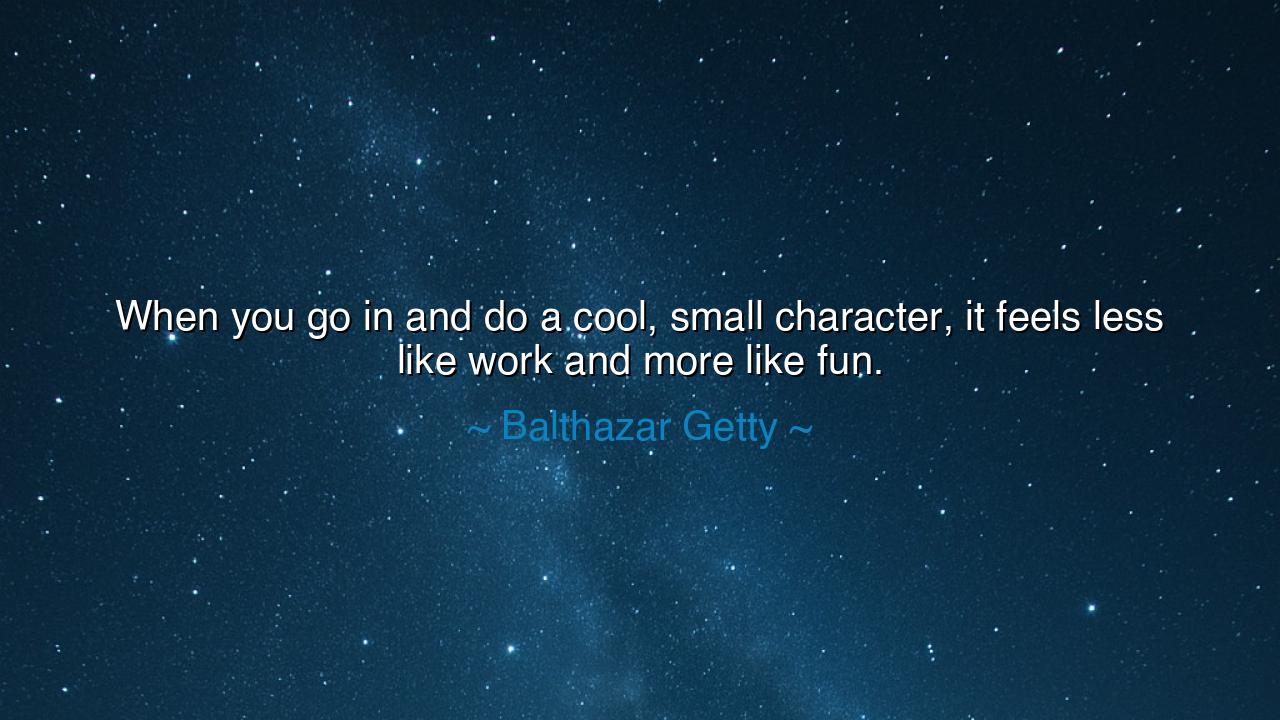
When you go in and do a cool, small character, it feels less like
When you go in and do a cool, small character, it feels less like work and more like fun.






In the grand dance of life, the greatest of endeavors are often those that ignite the spirit with joy and creativity, not those that are forced or weighed down by obligation. Balthazar Getty speaks to this truth when he says, "When you go in and do a cool, small character, it feels less like work and more like fun." His words echo a profound understanding of the human need to create with passion and to engage in work that feels more like an expression of the soul than a chore to be completed. It is the nature of the human spirit to thrive not in the realm of rigid duty but in the world where imagination and play take center stage.
The ancients understood this truth well. In the Greek tragedies, the role of the actor was not simply to recite lines but to embody the essence of the characters they portrayed. The great Sophocles and Euripides wrote plays not just to entertain, but to allow the actors to explore deep human emotions and the nature of the gods. The actors, in their performances, sought not to toil but to enter into a kind of divine flow, where the work was infused with the joy of creation. This resonates with Getty’s reflection—when the work is playful, when it allows one to embody something small yet significant, it transcends the realm of labor and enters the domain of art, which is always meant to be a joyful expression.
In this, there is wisdom akin to that found in Aristotle’s teachings on eudaimonia, or flourishing. According to Aristotle, the pursuit of happiness and fulfillment is found not in the pursuit of wealth or status, but in the practice of one's craft with true passion and integrity. Getty’s words align with this idea, for he suggests that in doing a "cool, small character," one is engaged not in a pursuit of recognition or reward, but in the act of creation itself. The joy of the craft lies in the doing, in the freedom to explore a role, to give it life without the pressure of expectations. The ancients taught that when we follow our passions, when we create freely, we live in accordance with our true nature.
The pursuit of joy in small things, in the art of creating rather than laboring, also resonates with the great Roman philosophers, especially Seneca, who warned against the dangers of living a life driven by duty alone. To him, the true path to happiness was to find pleasure in the simple and the small. In his letters, Seneca often spoke of the value of simple pleasures and the importance of cultivating a life where work was not seen as burdensome but as an opportunity for growth and fulfillment. Getty’s sentiment reflects this timeless wisdom: when we approach work as an opportunity to express ourselves, to engage with our passions, we free ourselves from the constraints of routine labor.
Moreover, Getty’s reflection brings to light the power of the creative process itself. It is often in small, seemingly insignificant moments of creation that true innovation and expression flourish. The legendary Leonardo da Vinci, though a master of grand works like the Mona Lisa, also found deep joy in small sketches and studies. These fleeting moments of creativity, though not monumental in scale, were integral to his broader body of work. Da Vinci often said, “Art is never finished, only abandoned.” The small, playful moments of creation are just as important as the great masterpieces, for they allow the artist to experiment, to explore, and to find joy in the process itself. In these moments, the work becomes fun, not because it is trivial, but because it is done with freedom and heart.
Getty’s insight invites us to recognize that, in life, the most meaningful work is often that which aligns with our inner spirit—work that brings joy, that allows us to express our creativity without fear or expectation. It is easy to get lost in the quest for greatness and to view every task as a burden to bear, but the true path to fulfillment lies in the joy of the journey itself. Whether in art, in our careers, or in our relationships, we must ask ourselves: Are we approaching this with a spirit of joy and creativity, or are we simply going through the motions?
The lesson here is simple yet profound: when we approach our work—whether large or small—with a sense of play and joy, we transform it from a task into an act of creation. Let us seek to infuse our days with the freedom to explore, to create, and to enjoy the process. The great heroes of the past, from Odysseus to Da Vinci, remind us that the true rewards lie not in the accolades we may receive, but in the joy of the craft itself. Just as Getty finds fun in his characters, so too should we find fun in the roles we play in our own lives, knowing that in embracing the work with passion and joy, we create something truly meaningful.






AAdministratorAdministrator
Welcome, honored guests. Please leave a comment, we will respond soon